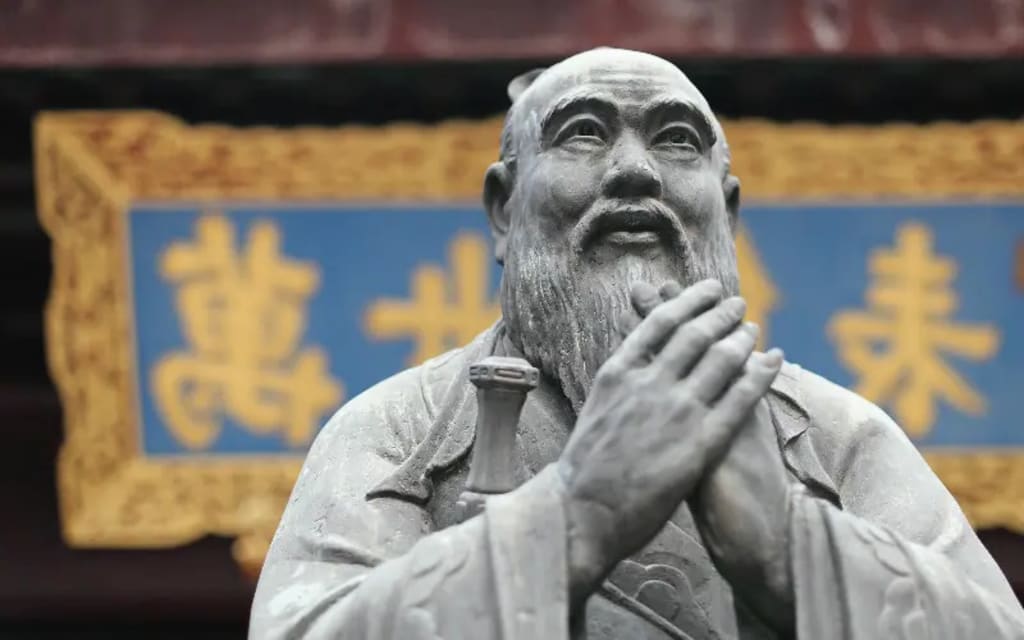Interview with the Spirit of Confucius: Insights on Virtue, Society, and Personal Growth
Wisdom and Practical Advice for Living a Fulfilling Life in Harmony with Others and the World Around Us

Welcome to this imaginary interview with the Spirit of Confucius, one of the most influential philosophers and teachers in Chinese history. Confucius' teachings have inspired generations of people to seek wisdom, cultivate virtue, and strive for a harmonious society. In this interview, we will explore some of his insights on various topics, including virtue, society, personal growth, and leadership. Through his wise and practical advice, we hope to gain a deeper understanding of how we can live fulfilling lives in harmony with others and the world around us. Let's begin our journey of discovery with the Spirit of Confucius.
Nadeem: Good day, Spirit of Confucius. Thank you for joining us today.
Spirit of Confucius: It's my pleasure to be here. Thank you for having me.
Nadeem: To start off, can you tell us a little bit about your life and teachings?
Spirit of Confucius: Certainly. I lived in China from 551 BCE to 479 BCE, and during that time, I developed a philosophy that emphasized morality, respect for authority, and social order. My teachings, known as Confucianism, became very influential in China and have had a lasting impact on Chinese culture and society.
Nadeem: That's very interesting. How do you think your teachings can be applied in today's world?
Spirit of Confucius: I believe that my teachings are still very relevant today. In particular, I think that they can help people to develop strong moral character and to live harmoniously with others. My philosophy emphasizes the importance of respect, honesty, and self-improvement, and I think that these values are just as important today as they were in ancient China.
Nadeem: You mentioned respect as an important value. How do you define respect?
Spirit of Confucius: For me, respect involves treating others with kindness, fairness, and courtesy. It means acknowledging their worth as human beings and recognizing their contributions and accomplishments. Respect is essential for maintaining harmonious relationships and creating a just society.
Nadeem: You also mentioned self-improvement. How can we improve ourselves according to your teachings?
Spirit of Confucius: According to my philosophy, self-improvement involves cultivating virtues such as compassion, humility, and wisdom. We should constantly strive to better ourselves, not just for our own benefit, but also for the benefit of those around us. We can do this by reflecting on our actions, learning from our mistakes, and seeking guidance from wise and virtuous individuals.
Nadeem: What is your view on education?
Spirit of Confucius: I believe that education is essential for personal growth and for the betterment of society. Education should emphasize moral and ethical principles, as well as practical skills and knowledge. Ideally, education should be available to everyone, regardless of their social status or background.
Nadeem: You emphasized the importance of social order. Can you elaborate on that?
Spirit of Confucius: Yes, social order is important because it allows people to live together peacefully and to cooperate for the greater good. Social order is maintained through respect for authority, adherence to laws and regulations, and a sense of social responsibility. When everyone does their part and fulfills their obligations, society can function smoothly and effectively.
Nadeem: How do you view the role of government in society?
Spirit of Confucius: I believe that government has a responsibility to promote the well-being of the people and to create a just and orderly society. This can be achieved by implementing laws and policies that are fair and equitable, and by providing essential services such as education, healthcare, and infrastructure. Government officials should be virtuous and capable, and should prioritize the common good over their own personal interests.
Nadeem: You mentioned the importance of virtuous leaders. How can we ensure that our leaders are virtuous?
Spirit of Confucius: One way is to promote education and cultivate virtue in society as a whole. When people are taught to value honesty, integrity, and social responsibility, they are more likely to choose leaders who embody these virtues. Additionally, we can hold our leaders accountable for their actions and demand that they act in the best interests of the people they serve.
Nadeem: How do you view the role of family in society?
Spirit of Confucius: Ah, the family is a fundamental unit of society. It provides a foundation for personal development and social stability. In my teachings, I emphasized the importance of filial piety, which is the respect and care for one's parents and ancestors. I believe that a strong family structure and the practice of filial piety can help to instill moral values and a sense of social responsibility in individuals, and contribute to a harmonious society.
Nadeem: You also mentioned the importance of compassion. How can we cultivate compassion in ourselves?
Spirit of Confucius: Compassion is an essential virtue that is central to my philosophy. It involves the ability to empathize with others and to act with kindness and generosity towards them. To cultivate compassion, we must first recognize the interconnectedness of all beings and understand that our own well-being is tied to the well-being of others. We can then practice acts of kindness and generosity in our daily lives, and seek to understand and empathize with others who are different from us.
Nadeem: How do you view the relationship between ethics and politics?
Spirit of Confucius: Ethics and politics are deeply intertwined. In my philosophy, the ultimate goal of politics is to create a just and harmonious society, and this can only be achieved by promoting ethical principles such as fairness, honesty, and social responsibility. Good governance requires leaders who embody these virtues and who prioritize the common good over their own personal interests.
Nadeem: What is your view on the relationship between religion and morality?
Spirit of Confucius: While I did not place a strong emphasis on religion in my philosophy, I believe that morality and spirituality are closely linked. A person's religious beliefs can provide a framework for ethical behavior and can inspire them to act with compassion and kindness towards others. However, I also believe that it is possible to be a moral person without necessarily adhering to any particular religion.
Nadeem: Can you give us an example of a practical application of your teachings in daily life?
Spirit of Confucius: One practical application of my teachings is the practice of the "golden rule" - treating others as you would like to be treated. This involves showing respect and kindness to others, and acting with empathy and compassion. By embodying this principle in our daily lives, we can promote harmonious relationships and create a more just and peaceful society.
Nadeemr: How do you view the relationship between tradition and progress?
Spirit of Confucius: Tradition and progress are not necessarily opposed to each other. While it is important to respect and honor traditional values and practices, we must also be willing to adapt and evolve as society changes. Progress should not come at the expense of important values and principles, but rather should be guided by them. By balancing tradition and progress, we can create a society that is both dynamic and harmonious.
Nadeem: Can you give us some advice on how to handle conflicts in our personal relationships?
Spirit of Confucius: Conflicts are a natural part of human relationships, but they can also be opportunities for growth and learning. To handle conflicts, it is important to approach them with a calm and respectful attitude, and to listen carefully to the perspectives of others. We should seek to find common ground and work towards a mutually beneficial resolution, rather than focusing on our own individual interests. Above all, we should strive to treat others with kindness and compassion, even in difficult situations.
Nadeem: What is your view on the role of art and aesthetics in society?
Spirit of Confucius: Art and aesthetics are an important part of human expression and can contribute to the beauty and harmony of society. However, I also believe that art should serve a moral purpose and should be used to promote
virtues such as compassion, filial piety, and social responsibility. In my teachings, I emphasized the importance of music as a means of cultivating these virtues in individuals and promoting harmony in society.
Nadeem: How can we balance individualism with social responsibility?
Spirit of Confucius: Individualism and social responsibility are not mutually exclusive. While it is important to recognize and cultivate our own unique talents and abilities, we must also recognize that we are part of a larger community and have a responsibility to contribute to its well-being. By embracing our individuality while also recognizing our interconnectedness with others, we can create a society that is both dynamic and harmonious.
Nadeem: Can you give us some advice on how to deal with failure?
Spirit of Confucius: Failure is an inevitable part of life, but it can also be a valuable learning experience. To deal with failure, we should approach it with a growth mindset and seek to learn from our mistakes. We should also strive to maintain a sense of humility and recognize that we are not infallible. Above all, we should not let failure define us, but rather use it as a stepping stone towards greater success.
Nadeem: What is your view on the role of education in society?
Spirit of Confucius: Education is a crucial component of a harmonious and just society. It provides individuals with the knowledge and skills they need to contribute to the common good and fulfill their potential. However, education should not be solely focused on academic knowledge, but should also emphasize moral and social values such as compassion, filial piety, and social responsibility.
Nadeem: How can we balance material prosperity with spiritual fulfillment?
Spirit of Confucius: Material prosperity and spiritual fulfillment are not mutually exclusive. While it is important to strive for material success, we must also recognize that true fulfillment comes from within and is not solely dependent on external factors. By cultivating virtues such as compassion and social responsibility, we can find meaning and purpose in our lives beyond material possessions.
Nadeem: What is your view on the relationship between nature and humanity?
Spirit of Confucius: Nature is an integral part of our existence and should be treated with respect and reverence. Humanity has a responsibility to protect and preserve the natural world, and to recognize the interconnectedness of all living beings. By living in harmony with nature, we can create a sustainable and just society for future generations.
Nadeem: Can you give us some advice on how to cultivate inner peace?
Spirit of Confucius: Inner peace comes from within and is cultivated through the practice of mindfulness and self-reflection. We should strive to maintain a sense of balance in our lives and avoid extremes of emotion or behavior. By cultivating a sense of inner calm, we can better navigate the challenges of life and contribute to the well-being of ourselves and others.
Nadeem: How can we promote ethical leadership in society?
Spirit of Confucius: Ethical leadership is crucial to creating a just and harmonious society. To promote ethical leadership, we must prioritize moral values such as honesty, fairness, and social responsibility in our leaders. We should also hold our leaders accountable for their actions and demand transparency and accountability in government and other institutions of power.
Nadeem: Can you give us some advice on how to cultivate a sense of purpose in life?
Spirit of Confucius: Cultivating a sense of purpose in life comes from finding meaning and fulfillment in our daily actions and relationships. We should strive to contribute to the common good and to live a life that is guided by moral and social values. By focusing on the well-being of others and working towards a greater good, we can find a sense of purpose and fulfillment in our lives.
Nadeem: How can we promote social harmony in a diverse society?
Spirit of Confucius: Social harmony can only be achieved when we recognize and respect the diversity of our society. We should strive to cultivate empathy and compassion towards those who may have different backgrounds, beliefs, and values from our own. By promoting dialogue, understanding, and mutual respect, we can create a society that is inclusive and just for all.
Nadeem: What is your view on the role of women in society?
Spirit of Confucius: Women have an important role to play in society, and their contributions should be valued and recognized. Women possess many of the same virtues that are valued in Confucianism, such as compassion, filial piety, and humility, and they have the potential to make significant contributions to the common good. Society should provide women with equal opportunities and respect their rights and dignity as human beings.
Nadeem: Can you give us some advice on how to balance work and personal life?
Spirit of Confucius: Balancing work and personal life is essential for maintaining a sense of well-being and fulfillment. We should strive to maintain a sense of balance in our lives, recognizing that our personal relationships and well-being are just as important as our professional responsibilities. We should prioritize self-care and make time for leisure activities, family, and friends, while also fulfilling our professional obligations to the best of our abilities.
Nadeem: How can we cultivate a sense of gratitude in our daily lives?
Spirit of Confucius: Gratitude is an important virtue that can bring joy and fulfillment to our lives. We should strive to cultivate a sense of gratitude by recognizing and appreciating the blessings and opportunities that we have in our lives. We should express gratitude to others for their kindness and generosity and practice mindfulness and reflection to develop a deeper appreciation for the world around us.
Nadeem: What is your view on the role of art in society?
Spirit of Confucius: Art is an important expression of human creativity and can contribute to the well-being and flourishing of society. Through art, we can explore and express the beauty and complexity of the world around us and connect with others on a deep level. Art can also serve as a means of promoting moral and social values, and can inspire us to work towards a better world.
Nadeem: Can you give us some advice on how to develop leadership skills?
Spirit of Confucius: Developing leadership skills requires a commitment to self-improvement and a dedication to moral and social values. We should strive to cultivate virtues such as empathy, humility, and social responsibility, and work towards developing a deep understanding of the needs and aspirations of those we seek to lead. We should also prioritize self-reflection and self-awareness, recognizing our own strengths and weaknesses and seeking to improve ourselves through continuous learning and growth.
As we conclude this interview with the Spirit of Confucius, we are left with a profound sense of gratitude and inspiration. His timeless teachings on virtue, society, personal growth, and leadership continue to resonate with people from all walks of life and cultures around the world. Through his emphasis on empathy, compassion, and self-reflection, Confucius reminds us of the importance of living a fulfilling life in harmony with others and the world around us. May his wisdom continue to guide us on our own journeys of self-discovery and personal growth. Thank you, Spirit of Confucius, for your valuable insights and guidance.
About the Creator
muhammad nadeem naqvi
Naqvi is a renowned writer and journalist from lahore, Pakistan. He has written several critically acclaimed books on social issues and has been recognized with several awards and honors for his work.






Comments (1)
This interview provides insightful reflections on the teachings of Confucius and how they can be applied to modern society.thkz for sharing